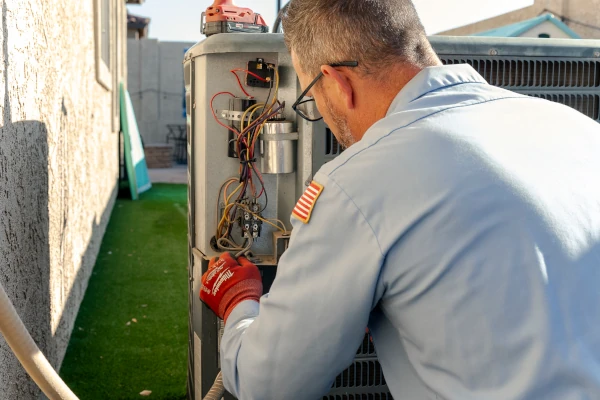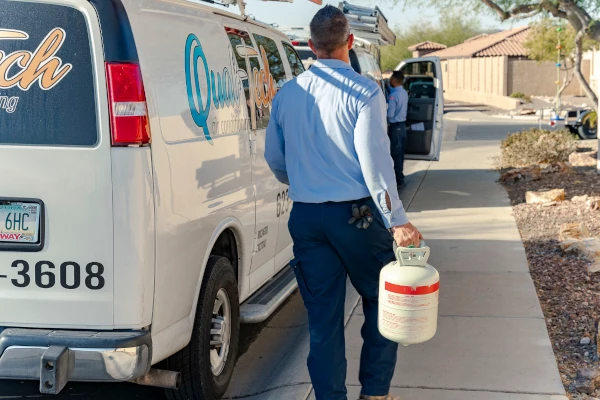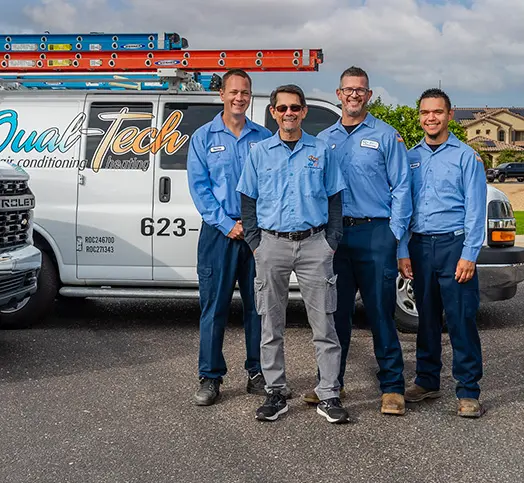Is your AC acting up? Would you know the signs your AC needs repair? Knowing when your air conditioner needs repair can save you from discomfort and costly breakdowns. In this article, we’ll explore 13 telltale signs that indicate your cooling system may require professional attention. From unusual noises to inconsistent temperatures, these warning signals can help you identify potential issues before they escalate. By staying vigilant and addressing problems early, you can extend the life of your AC unit and ensure optimal performance during those sweltering summer months.
Poor Performance
One of the most obvious signs your AC needs repair is poor performance (it’s simply not cooling very well). We’ll cover a few areas in which your AC unit may be preforming poorly. If you notice your unit performance has sharply dropped in any way, it’s good to call a professional.
1. Warm Air
One of the primary signs your AC needs repair is when it starts blowing warm air instead of cool. That’s a clear sign of malfunction. This issue could stem from various problems, including refrigerant leaks, compressor failures, or blocked airflow. Don’t ignore this symptom, as it often indicates a serious underlying issue requiring immediate attention.
You can figure out whether your AC is blowing cold air by setting your thermostat to a temperature well below the current room temperature. After allowing the system to run for a few minutes, you can place your hand in front of the vents. The air should feel noticeably cool. If it’s warm or at room temperature, your AC isn’t cooling properly.
2. Weak Airflow
Another of the signs your AC needs repair is weak airflow from your AC vents. This issue can stem from various causes, including clogged air filters, blocked ducts, or a failing blower motor. Not only does weak airflow reduce your comfort, but it also forces your system to work harder, potentially leading to increased energy costs and further damage if left unaddressed.
To check for weak airflow, place your hand in front of each AC vent while the system is running. You should feel a strong, steady stream of cool air. If the airflow feels faint or inconsistent across different vents, it’s likely a sign of trouble. Pay attention to rooms that aren’t cooling as quickly as usual, as this can also indicate weak airflow.
3. Inadequate Cooling
Inadequate cooling is another of the signs your AC needs repair, and is a common issue that older ACs exhibit. If your house isn’t reaching the temperature you’ve set on the thermostat, your AC system may be struggling. This problem can stem from various causes, including low refrigerant levels, dirty air filters, faulty thermostats, or an undersized unit for your space.
To diagnose inadequate cooling, set your thermostat lower than the current room temperature. After 30-60 minutes, check if the indoor temperature has dropped accordingly. Use a separate thermometer to verify your thermostat’s accuracy. If the temperature remains high, check and replace dirty air filters, and ensure all vents are open and unobstructed. If these steps don’t help, it’s time to call a professional for inspection and potential repair.

4. Increased Electrical Bills
A sudden spike in your electric bill can be one of the signs your AC needs repair. As air conditioning systems age or develop problems, they often become less efficient, consuming more energy to maintain the same level of cooling. You can compare your current bills to those from the same period last year to spot unusual increases in energy consumption.
Air Quality
Air quality issues can be signs of a malfunctioning AC. If you notice worsening air quality, it may indicate problems with your system’s air filtration, moisture control, or ventilation components. These issues warrant a professional inspection, not only for the air conditioner’s sake, but your family’s health as well.
5. Strange Odors
Unusual odors emanating from your AC vents can be signs your AC needs repairs. A musty smell often indicates mold or mildew growth within the system. Burning odors could signal electrical issues or overheating components. A sweet, chemical scent might suggest a refrigerant leak. Always take these olfactory warnings seriously and seek professional inspection.
6. High Humidity
Excessive indoor humidity, while not dangerous, can indicate your AC issues. Your air conditioner should not only cool but also dehumidify your home. If you notice condensation on windows, a clammy feeling, or mold growth, your AC may be struggling to remove moisture effectively. This could stem from issues like incorrect unit sizing or malfunctioning components. warnings seriously and seek professional inspection.
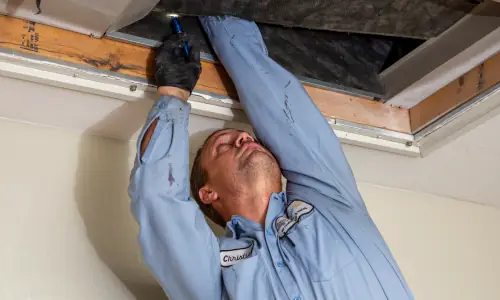
7. Abnormal amounts of Dust
An unusually dusty home despite regular cleaning can indicate AC issues. If you notice more dust accumulating on surfaces or floating in the air when your system runs, it may signal problems with your air filter or ductwork. A properly functioning AC should help reduce dust by filtering air as it circulates. Excessive dust could mean your filter is clogged or your ducts have leaks allowing debris to enter.
Malfunctions
Malfunctions in your air conditioning system are signs your AC needs repair. From strange noises to frequent cycling, these operational issues suggest underlying problems that require professional attention to prevent further damage and ensure optimal performance.
8. Strange Noises
Strange noises coming from your air conditioner are often early warning signs of mechanical issues. These unusual sounds can indicate various problems, from minor annoyances to serious malfunctions. Be alert for the following noises, as they may signal the need for professional inspection:
- Buzzing: Often indicates electrical problems or loose parts.
- Clicking: May suggest a failing thermostat or control board issue.
- Banging: Could be a sign of a loose or broken part in the compressor.
- Squealing: Usually points to belt issues or motor bearing problems.
- Hissing: Commonly associated with refrigerant leaks.
- Rattling: Might indicate loose screws, bolts, or other components.
- Screaming or whistling: Could signal high internal pressure in the compressor.
- Thumping: Often means the blower is unbalanced.
- Humming: Might suggest electrical issues or a failing capacitor.
- Clanking: Typically indicates a loose or out-of-balance part in the compressor.
9. Malfunctioning Thermostat
A malfunctioning thermostat can lead to numerous AC issues, including inconsistent cooling, short cycling, or complete system failure. As the control center of your HVAC system, a faulty thermostat can cause your AC to run inefficiently, resulting in discomfort and increased energy bills. It may struggle to maintain the set temperature or fail to communicate properly with your air conditioner.
To determine if your thermostat is the problem, check if the display is working correctly and if it responds to your inputs. Compare the thermostat’s reading with a separate thermometer. If your AC doesn’t turn on when it should or runs erratically, try replacing the batteries. Persistent issues likely indicate a faulty thermostat.
10. Water Leaking
11. Frozen Coils
Frozen evaporator coils are one of the serious signs your AC needs repair. If you notice ice buildup on your unit’s indoor coils or refrigerant lines, it indicates a problem with airflow or refrigerant levels. This issue can stem from dirty air filters, low refrigerant, or blocked return vents. Frozen coils prevent proper cooling and can lead to compressor damage if left unaddressed.
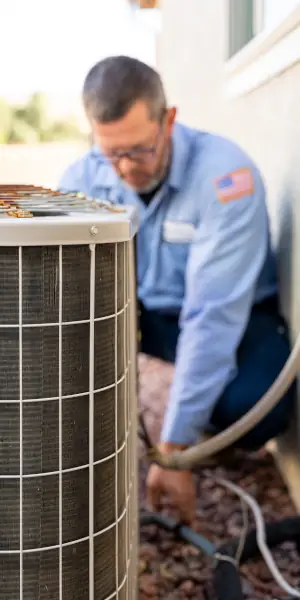
12. Malfunctioning Fan
A malfunctioning fan is often a dead giveaway that your air conditioner needs repair. While fans aren’t technically necessary for ACs to operate, having a broken fan can lead to massively decreased efficiency and a proclivity for other issues. If you notice a lack of airflow or hear the system running without feeling any cool air, check on the fan to make sure it’s operating correctly. A malfunctioning fan can also cause short cycling, which can quickly cause damage to your unit.
13. Tripping Breakers
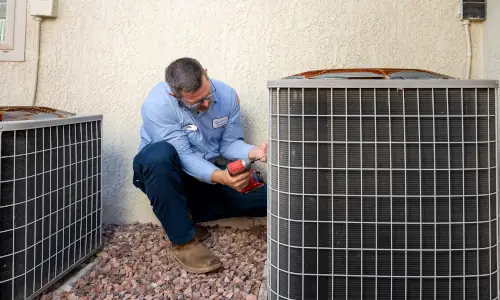
An air conditioner repeatedly tripping circuit breakers is are one of the many possible signs your AC needs repair. This problem can stem from various causes, including overloaded circuits, short circuits, or a failing compressor. Ignoring this issue not only disrupts your comfort but also poses potential fire hazards. Frequent breaker trips also indicate your AC system is drawing more power than it should.
To determine if your AC is tripping breakers, pay attention to when power outages occur. If they coincide with your AC turning on or during its operation, it’s likely the culprit. Check your electrical panel for any switches in the “off” position after these incidents. Keep a log of how often this happens. If you’re resetting the same breaker repeatedly, especially on hot days, your AC is likely the cause.
Recognizing the signs your AC needs repair is crucial to maintaining and repairing a system. Regular maintenance and prompt attention to these warning signals can extend your AC’s lifespan and ensure efficient operation. If you’ve noticed any of these issues, don’t wait for a complete breakdown. Contact us today to inspect and service your air conditioning system. We never sell you a replacement when a repair will do just fine. You can reach us at (623) 234-3608, or visit our AC repair, or AC maintenance page to learn more!


